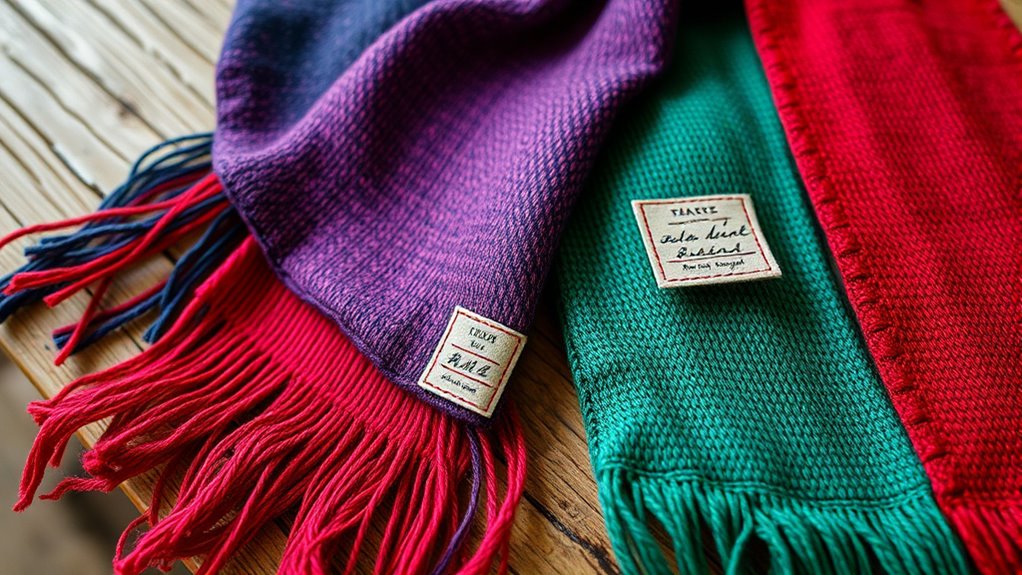Understanding weavers’ cooperative labels helps you identify textiles made ethically, with cultural significance, and fair treatment for artisans. These labels often feature symbols or logos indicating sustainable practices like natural dyeing and fair wages. They also verify origin and authenticity, guaranteeing you support communities, preserve traditions, and make eco-conscious choices. Recognizing these labels allows you to trust your purchases and promote responsible fashion—if you want to learn more, keep exploring how these labels ensure ethical and cultural integrity.
Key Takeaways
- Labels indicate the textile’s origin, traditional techniques, and cultural heritage, emphasizing authenticity and regional craftsmanship.
- Certification marks verify ethical standards, including fair labor, eco-friendly practices, and sustainable dyeing methods.
- Recognizable symbols showcase natural dyes, eco-conscious production, and adherence to fair trade and social responsibility.
- Traceability labels help consumers confirm genuine artisan-made textiles and support local communities.
- Transparent labels foster trust, empower ethical purchasing, and promote the preservation of indigenous weaving techniques.
The Role of Weavers’ Cooperative Labels in Ethical Shopping
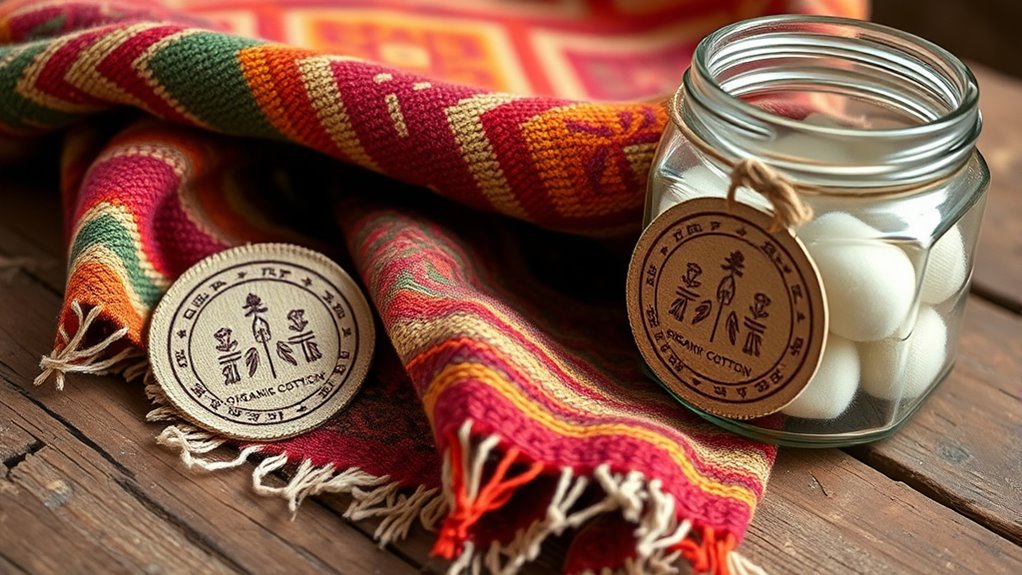
Weavers’ cooperative labels play a crucial role in ethical shopping by providing consumers with transparent information about the origin and production of textiles. These labels highlight the cultural heritage embedded in each piece, showcasing traditional techniques and regional craftsmanship. By supporting cooperative-labeled products, you help preserve local customs and artisan skills that might otherwise fade. Additionally, these labels promote artisan empowerment by ensuring fair wages and better working conditions for weavers. When you choose textiles with cooperative labels, you’re not just buying a product—you’re supporting a community’s cultural legacy and helping artisans sustain their livelihoods. This transparency encourages responsible consumption and fosters a deeper connection between you and the handcrafted origins of your textiles. The use of resources and tools can also help verify the authenticity of these labels, ensuring that ethical standards are maintained throughout the supply chain. Incorporating certification programs further strengthens trust in the authenticity and ethical integrity of cooperative-labeled textiles. Moreover, understanding certification standards can provide consumers with greater confidence in the ethical practices behind the products they purchase. Engaging with ethical shopping practices can also enhance your awareness of the importance of supporting sustainable and culturally significant products.
Key Symbols and Logos to Recognize on Cooperative Textiles
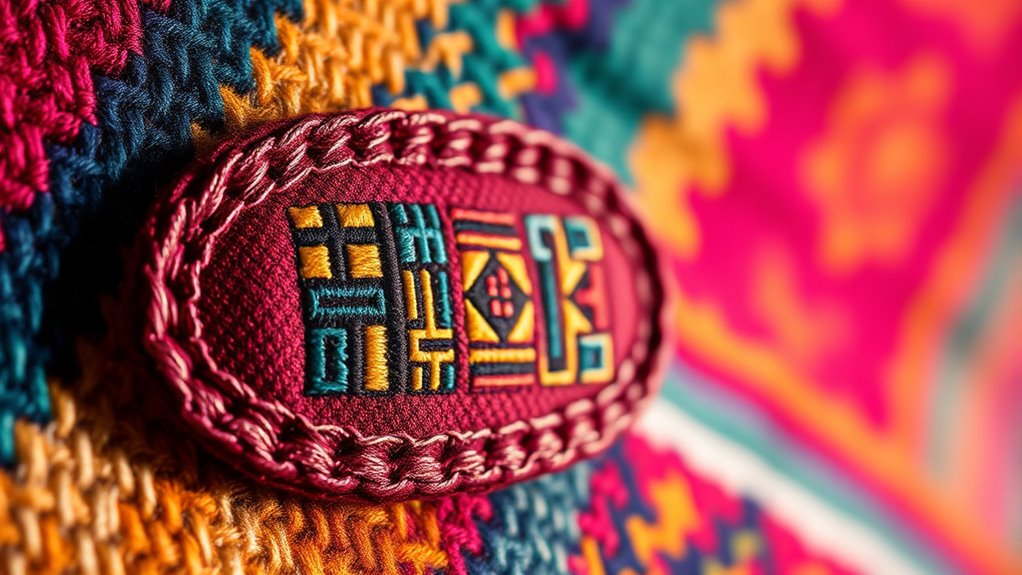
Recognizing key symbols and logos on cooperative textiles helps you quickly identify products that meet ethical and cultural standards. These symbols often indicate specific weaving techniques or practices like natural dyeing methods or traditional textile dyeing processes. Look for logos that showcase symbols of handwoven patterns, indicating artisanal weaving techniques, or icons representing eco-friendly dyeing practices. Additionally, some symbols may reflect adherence to sustainable practices, ensuring environmentally responsible production methods. Understanding these symbols can also help you appreciate the cultural significance of traditional weaving methods and promote fair trade practices. Recognizing ethical certifications can further assure consumers of the product’s compliance with fair labor standards and environmentally conscious practices. Being familiar with these symbols supports responsible purchasing and encourages sustainable development within artisan communities. Familiarity with weaving techniques and associated symbols enhances your ability to select authentic and ethically produced textiles.
Understanding Certification Standards and Their Significance

Certification standards guarantee that the textiles you choose meet ethical and quality benchmarks. They also help your products gain trust and recognition in competitive markets. Understanding these standards empowers you to make informed decisions that benefit both producers and consumers. Incorporating knowledge of vetted can further enhance collaboration and trust within cooperative networks. Additionally, awareness of debt forgiveness policies can inform financial planning and sustainability efforts for cooperatives. Recognizing leadership development principles can strengthen the management and operational capacity of cooperative members. Being aware of trustworthiness of Patchology and other reputable brands can serve as a model for maintaining high standards in cooperative labeling practices.
Ethical Standards Compliance
Understanding certification standards is essential because they set clear benchmarks for ethical production and social responsibility. When a cooperative complies, you can trust that the craftsmanship quality is high and that dye safety is prioritized. This ensures that the products are safe for consumers and the environment, reflecting genuine ethical practices. To meet these standards, cooperatives often focus on:
- Ensuring fair wages and safe working conditions
- Using non-toxic dyes and sustainable materials
- Maintaining consistent craftsmanship quality throughout production
- Implementing sound recording techniques to accurately document and verify ethical practices during production processes
- Promoting aquatic exercise and water safety awareness among artisans and workers to foster healthier working environments. Recognizing the importance of cultural narratives in promoting sustainable and meaningful practices also plays a vital role in authentic certification adherence.
Adhering to these standards helps you identify labels that truly represent ethical practices, giving you confidence in the products you support. Ultimately, ethical standards compliance safeguards both artisans’ rights and the integrity of the cooperative’s reputation.
Market Recognition Benefits
Have you ever wondered how labels can boost a cooperative’s reputation in the marketplace? Certification labels signal quality and authenticity, helping your traditional weaving products stand out. When consumers see recognized standards, they trust that your cooperative maintains high craftsmanship and ethical practices. This recognition not only attracts more buyers but also supports cultural preservation, ensuring traditional weaving techniques are valued and passed down. Market recognition benefits extend beyond sales; they enhance your cooperative’s reputation as a guardian of cultural heritage. As a result, your products gain credibility, opening doors to new markets and partnerships. Ultimately, understanding certification standards empowers you to showcase the unique skills behind your traditional weaving, promoting cultural preservation while gaining the respect and recognition your cooperative deserves.
How Labels Reflect Fair Wages and Worker Rights

When you see a cooperative label, it often indicates transparent wage practices and adherence to ethical labor standards. These labels show that workers earn fair wages and their rights are protected. Recognizing these signs helps you make informed choices that support fair treatment in the industry.
Transparent Wage Practices
Transparent wage practices are a key indicator of a weavers’ cooperative label’s commitment to fairness and worker rights. When labels clearly communicate wage structures, you can trust that artisans are fairly compensated for their craftsmanship, which sustains cultural heritage. Transparency promotes accountability and helps prevent exploitation. Look for labels that:
- Clearly specify wages and payment schedules
- Share information about wage calculation methods
- Support fair compensation aligned with artisan craftsmanship and cultural traditions
Ethical Labor Standards
How do weavers’ cooperative labels demonstrate their commitment to ethical labor standards? They highlight fair wages and worker rights, ensuring everyone receives equitable compensation. These labels often require transparent practices, including sustainable material sourcing that minimizes environmental harm. An environmental impact assessment is typically part of their standards, showing they prioritize both people and planet. By adhering to these criteria, cooperatives prove their dedication to safe working conditions and fair treatment. They also promote fair trade principles, advocating for workers’ rights across the supply chain. When you see these labels, you can trust that the products come from environments where ethical labor standards are upheld, supporting sustainable livelihoods and responsible production methods. This commitment strengthens both the community and the integrity of the craft.
The Importance of Origin and Traceability in Cooperative Labels
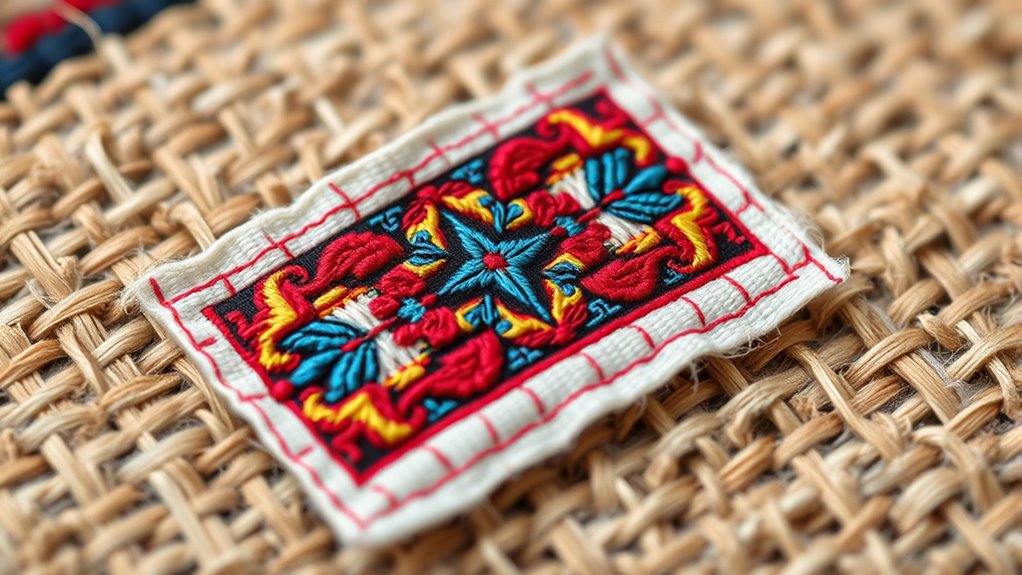
The importance of origin and traceability in cooperative labels cannot be overstated, as they directly influence consumer trust and product authenticity. Knowing where your textiles come from helps preserve their cultural significance and regional authenticity. When you see a label indicating origin, you’re supporting local communities and respecting traditional weaving practices. Traceability guarantees you can verify that the product is genuine and ethically produced. This transparency builds confidence and discourages counterfeit or misleading claims. Key aspects include:
Knowing the origin and traceability of textiles supports authenticity, cultural preservation, and ethical production.
- Verifying the cultural significance behind the weaving techniques
- Ensuring regional authenticity and fair trade practices
- Supporting sustainable development in local communities
Differentiating Between Genuine and Misleading Labels
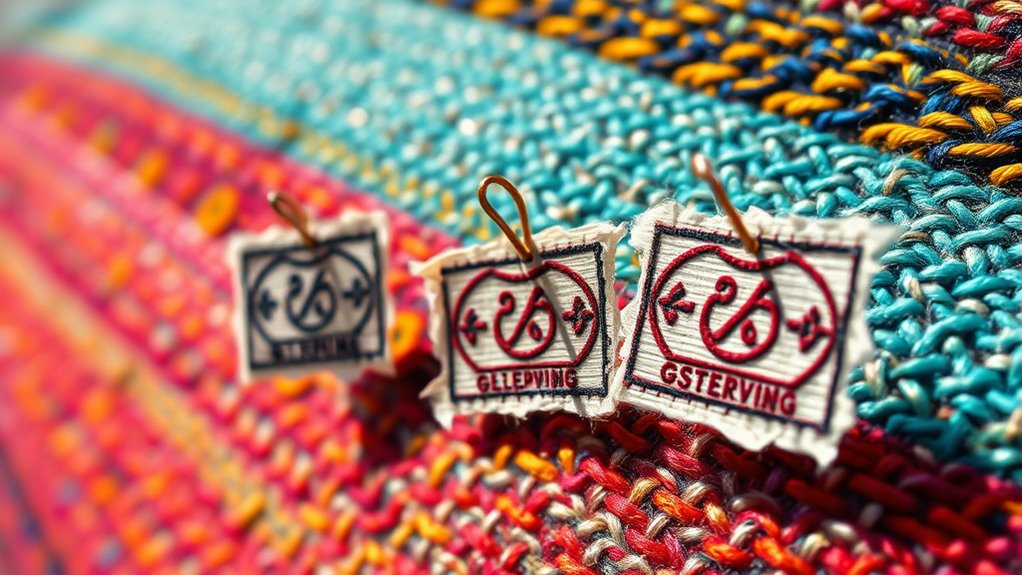
Are you able to tell if a cooperative label is genuine or just a marketing ploy? Genuine labels emphasize artisanal craftsmanship and protect cultural heritage, ensuring products are crafted with traditional methods. Look for specific details like certification seals, detailed origin information, and transparent production processes. Misleading labels often use vague terms like “handmade” or “authentic” without proof, aiming to attract buyers without offering real value. Authentic labels are backed by recognizable authorities or cooperatives that verify the product’s origin and craftsmanship. By paying attention to these indicators, you can distinguish true representations of cultural heritage from superficial marketing tricks. Recognizing genuine labels helps support artisans committed to preserving traditional techniques and ensures your purchase genuinely celebrates cultural craftsmanship.
The Impact of Cooperative Labels on Local Communities and Traditions

Genuine cooperative labels do more than verify product authenticity; they actively strengthen local communities and preserve cultural traditions. When you support products with these labels, you help sustain local craftsmanship and foster cultural preservation. This impact encourages artisans to maintain traditional techniques and pass them down through generations. It also promotes economic stability within communities. By choosing certified cooperative products, you contribute to:
- Protecting indigenous weaving methods
- Supporting fair wages and working conditions
- Ensuring the longevity of cultural heritage
These labels create a direct link between consumers and artisans, empowering local communities and keeping traditional practices alive. Your support helps preserve the unique identity of regional crafts, ensuring they remain vibrant parts of cultural heritage.
Tips for Verifying the Authenticity of Cooperative Labels
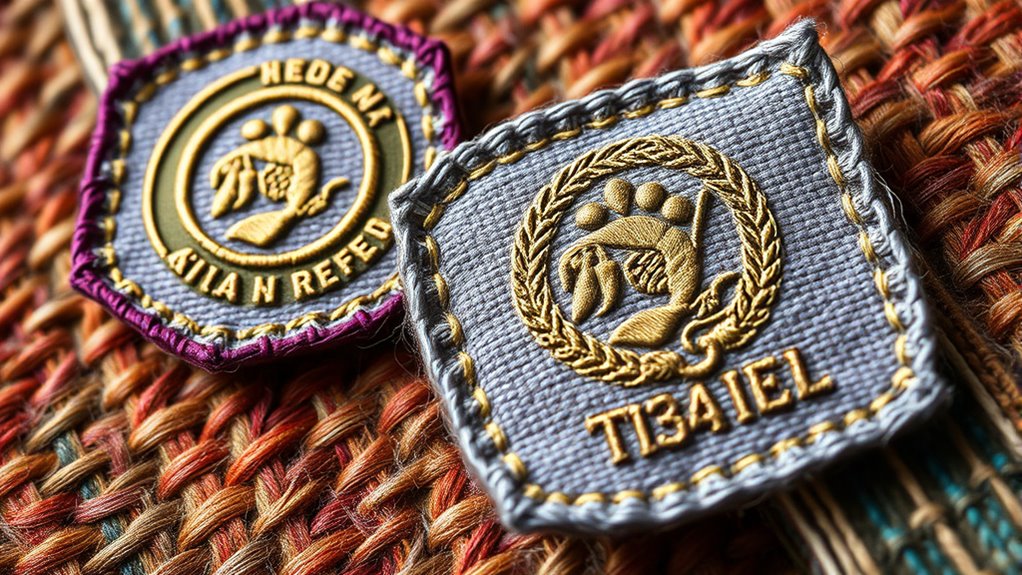
To make certain you’re supporting truly authentic cooperative products, it’s essential to know how to verify their labels effectively. First, check for official certification marks or seals that indicate the product’s origin and adherence to quality standards. Look for details that highlight artisan craftsmanship and cultural significance, confirming the piece was made by skilled weavers respecting traditional techniques. Be cautious of labels that lack transparency or seem generic. Use this table to compare features:
| Authentic Label Feature | Common Red Flags |
|---|---|
| Clear origin and certification | Vague or missing origin info |
| Emphasis on artisan craftsmanship | Mass-produced appearance |
| Cultural symbols or signatures | No cultural context or symbols |
| Traceable production process | Unverifiable or inconsistent info |
Verifying these elements ensures your purchase genuinely honors the cooperative’s heritage.
The Benefits of Supporting Certified Weavers’ Cooperatives
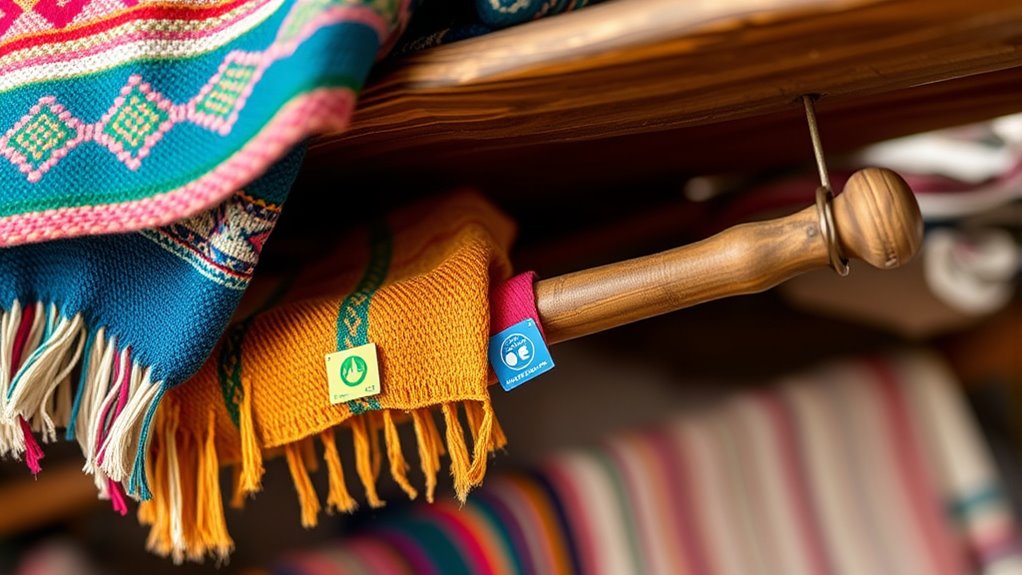
Supporting certified weavers’ cooperatives offers tangible benefits that extend beyond individual purchases. By choosing these cooperatives, you help preserve the rich handloom heritage and promote artisan empowerment. When you support certified cooperatives, you contribute to:
- Sustaining traditional weaving techniques for future generations
- Ensuring fair wages and better working conditions for artisans
- Promoting ethical and sustainable fashion choices
Your support helps maintain the cultural significance of handloom crafts while empowering local communities. Certified labels guarantee authenticity, so you’re investing in products that honor craftsmanship and social responsibility. Additionally, your purchases encourage the continuation of age-old traditions, preserving the unique identity of handloom heritage. In turn, you foster a more sustainable fashion industry that values both quality and ethical practices.
How to Use Labels to Make More Sustainable Fashion Choices
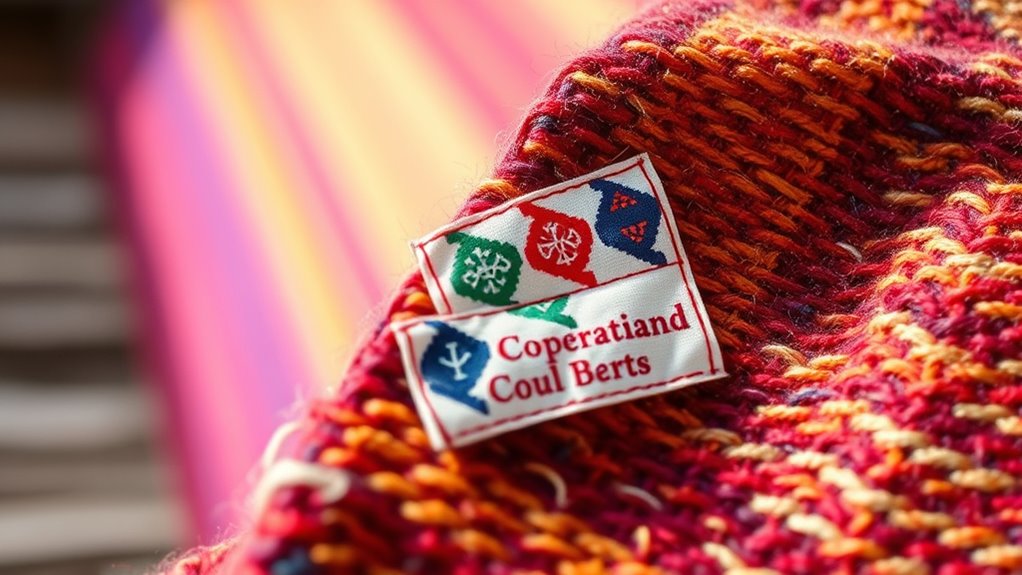
When you look at clothing labels, make certain you can identify authentic ones that truly reflect ethical practices. Supporting producers who prioritize fairness and sustainability ensures your choices make a positive impact. By paying attention to these labels, you can easily choose fashion that aligns with your values.
Recognizing Authentic Labels
Recognizing authentic labels is essential for making truly sustainable fashion choices. Genuine labels often highlight cultural significance and showcase artistic craftsmanship, reflecting the true origin and effort behind each piece. To spot authentic labels, look for clear indicators such as:
- Certification symbols from trusted organizations
- Detailed descriptions of traditional techniques and cultural heritage
- Consistent branding that aligns with known cooperatives or artisans
Authentic labels celebrate the artistry and cultural importance of weaving communities, ensuring your purchase supports sustainable practices. By paying close attention to these details, you can confidently identify genuine products that honor traditional craftsmanship and promote ethical production. Recognizing these labels helps you make informed choices that preserve cultural legacies and support sustainable fashion.
Supporting Ethical Producers
Ever wondered how to guarantee your clothing choices promote fairness and sustainability? Supporting ethical producers means looking for labels that highlight artisans’ craftsmanship and cultural preservation. These labels show that skilled artisans create each piece, ensuring fair wages and decent working conditions. By choosing products with trusted labels, you help sustain traditional techniques and prevent cultural erosion. Ethical labels often indicate environmentally friendly practices too, reducing harm to ecosystems. When you buy consciously, you’re not just getting unique, quality fashion—you’re empowering communities and protecting cultural heritage. Your choices encourage brands to prioritize transparency and fairness. Ultimately, supporting ethical producers through informed label recognition helps promote a more sustainable, respectful fashion industry that values artisans’ craftsmanship and cultural preservation equally.
Frequently Asked Questions
How Do Cooperative Labels Influence Consumer Purchasing Decisions?
You notice that cooperative labels can substantially influence your purchasing decisions. When you see labels indicating fair trade or ethical sourcing, you’re more likely to trust that the product was made responsibly. These labels assure you that workers are treated fairly and resources are sustainably sourced. As a conscious consumer, you tend to support brands with such labels, knowing you’re helping promote social equity and environmental sustainability through your choices.
What Are Common Misconceptions About Weavers’ Cooperative Labels?
When you hear about weavers’ cooperative labels, you might believe they always guarantee ethical practices or high-quality products. But that’s a myth debunking; not all labels guarantee authenticity. You should verify the label’s credibility rather than assuming its legitimacy. Don’t rely solely on the label—research the cooperative’s reputation to confirm label authenticity, ensuring you support truly ethical and quality craftsmanship instead of falling for misconceptions.
How Do Cooperative Labels Impact Local Economies Beyond the Textile Industry?
You see, cooperative labels like Fair Trade and Cultural Preservation boost local economies by promoting fair wages, supporting artisans, and sustaining traditions. They foster community development, encourage entrepreneurship, and attract responsible consumers. These labels create ripple effects, empowering communities beyond textiles, stimulating local markets, and preserving cultural heritage. By choosing products with cooperative labels, you help strengthen economies, uphold values, and guarantee livelihoods thrive, making a meaningful difference worldwide.
Can Cooperative Labels Guarantee the Highest Environmental Standards?
You might think cooperative labels guarantee the highest environmental standards, but that’s not always the case. While they promote sustainable farming and fair labor practices, standards can vary among cooperatives. It’s important to research specific labels and verify their commitments. Remember, a cooperative label indicates effort toward sustainability, but it doesn’t automatically assure top environmental standards—so stay informed and look for transparent certifications.
What Challenges Do Cooperatives Face in Maintaining Label Authenticity?
Imagine a delicate tapestry unraveling, each thread representing supply chain transparency and cultural authenticity. You face challenges ensuring these threads stay intact, as false labels threaten to distort the picture. Cooperatives struggle to verify authenticity amid complex supply chains, risking consumer trust. Maintaining genuine labels demands constant vigilance, transparent practices, and cultural respect. Without these efforts, the vibrant story behind each product risks being lost in a web of deception.
Conclusion
By understanding and trusting weavers’ cooperative labels, you can make smarter, more ethical fashion choices. These labels act as a beacon, guiding you through the maze of products and ensuring you support fair wages, authentic craftsmanship, and local communities. When you pay attention to these symbols, you’re not just buying a piece of fabric—you’re planting seeds for sustainable traditions to flourish. Keep your eyes open, and let these labels steer you toward a better, more responsible wardrobe.
